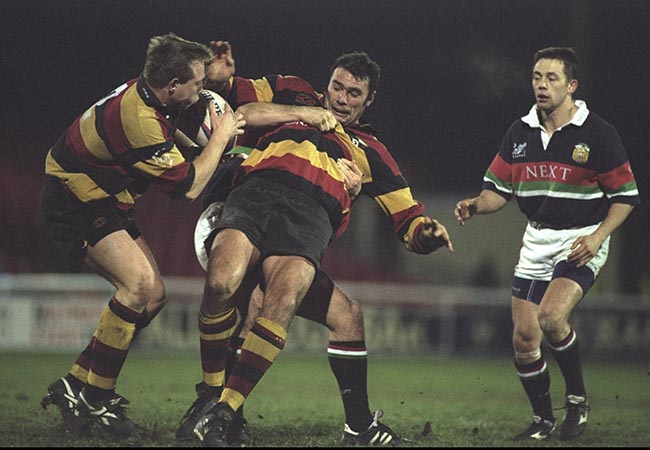 Sometimes I wonder at the naivety of some of our rugby journalists and their lack of understanding of the game at any level below the Premiership. This week Mick Cleary wrote an article in the Telegraph espousing the view that many of rugby’s problems would simply disappear should the game go back to being purely amateur below a certain level, but he didn’t define which level.
Sometimes I wonder at the naivety of some of our rugby journalists and their lack of understanding of the game at any level below the Premiership. This week Mick Cleary wrote an article in the Telegraph espousing the view that many of rugby’s problems would simply disappear should the game go back to being purely amateur below a certain level, but he didn’t define which level.
His article was sparked by a virtual rebellion from the Northern clubs (not unheard of before in the game – remember 1895?) over the attempted restructuring of their leagues. They currently have four leagues of 14 clubs and the RFU want to change this to eight leagues of 12 clubs with the additional 40 clubs coming from level six.
Many of the concerns for the Northern clubs were, in part, due to the financial consequences of any changes and possible mismatches. Cleary’s article had wistful images of clubs that were run by any number of volunteers cleaning the club, organising the bar and the fixtures, doing all the jobs that are now done by the paid staff.
While much of that was true it doesn’t reflect a true image of how the game was managed then, or how and why it has changed now. Many of those functions at all levels of the game below the elite professional end of the game are still maintained by unpaid volunteers (even Twickenham uses volunteer stewards) but other costs have come into the equation that just were not there in the past.
The RFU have advised clubs to become a form of limited companies with all their additional costs to protect the old amateur officers of the clubs (volunteer presidents, chairmen and organisers) from any financial liabilities should clubs get into financial difficulties.
As a result, clubs have had to be run on a more commercial business line with more than just ‘fag packet’ accounts because, as any club secretary will tell you, it costs an awful lot of money to run a rugby club even if you don’t pay players and use as many volunteers as you can.
Back then it was not unusual for clubs to run seven or eight adult teams with regular fixtures down to 5th or 6th team level as well as the mini and junior sections – but that has all changed. Before professionalism, the RFU introduced leagues to enable clubs to reach their potential without the age old problem of getting fixtures against clubs that thought they were better.
Rather like the current restructuring there was a mixed response from, “keep it as it is”, to a whole-hearted acceptance of what leagues could offer. But in order for leagues to work they needed universal acceptance, so the RFU offered a cherry for the top of the cake.
That cherry was incremental, increased funding as you progressed up the league ladder to the top which, as all clubs always needed more money just to survive, brought the doubters on board and leagues were put in place.
One consequence of the offer of better funding for the higher league in which a club played was to focus the minds and change the priorities of ambitious clubs at all levels. During the amateur era the priority of clubs was to field as many teams as they could because the majority of funds raised by a club were through its membership and the money spent behind the bar.
It was not unusual, as Cleary said, for the 2nds and 4ths to stay in the club bar waiting the return of the 1sts and 3rds to either celebrate or commiserate with them over a few pints. A club was defined by the results of all their teams. Once leagues came in, the 1st XV became the focus because if they lost, the club would lose status and possibly have to play in a different league against clubs that had no local affiliations.
As a result, clubs cut the number of teams they fielded and hoped the shortfall in membership revenue would be more than matched by the additional funds from the RFU as the club climbed the leagues. This made it increasingly difficult for the clubs that still tried to maintain a ‘traditional’ number of teams to find fixtures for teams below the 3rd or 4th team level, eventually forcing the loss of the lower teams.
Cleary is right when he says there are too many players being paid at lower levels of the game, particularly as the vast majority of them don’t deserve the money they take, but that is out of fear of relegations and the incumbent loss of players that usually follows even at the lowest levels.
Most clubs that don’t pay their players will pay a coach because they hope that a ‘professional’ approach will help stave of relegation (something that at all levels has a damaging impact) and may help achieve success (promotion). The coaches can bring a level of organisation and structured training but many will have little impact beyond that, particularly if the players are not enthusiastic about training.
The problems for the clubs was, having sold themselves to leagues and reduced the number of teams they fielded, the RFU slowly reduced the level of direct funding to zero instead of increasing it. That has left clubs with little or no option but to continue in the hope that a run of success could take them to the level where funding is still provided, while still relying heavily on the volunteers and/or benefactors.
In opening the Pandora’s Box of leagues sold as a dream with the promise of more money and better rugby for all, they have become a nightmare for some. But that is no reason to end the dream.
























Pingback: devops solutions